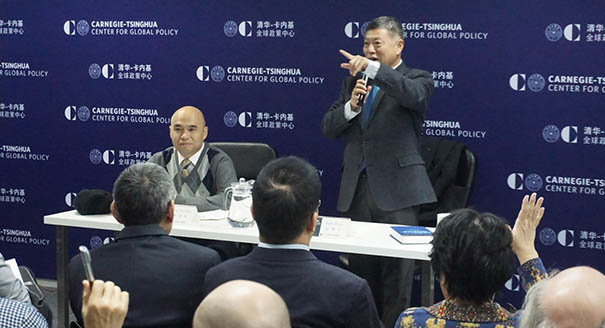Registration
You will receive an email confirming your registration.
President Donald Trump’s “America First” policies have called into question the traditional role of the United States as a global leader in the post-World War II era at a time when China appears to be playing a more active and ambitious international role. As President Trump retreats from regional initiatives like the Trans-Pacific Partnership and international agreements such as the Paris Climate Agreement, Chinese President Xi Jinping has increasingly defended globalization and is now offering the Chinese development model as an alternative for working with other nations. This juxtaposition of approaches to global governance has led to some speculation that China is now seeking to fill the void in international leadership left by the United States, while others argue that China lacks both the political will and capability to do so.
The Carnegie–Tsinghua Center’s Tang Xiaoyang moderated a discussion with Sam Zhao, director of the Center for China-U.S. Cooperation at the University of Denver, on the future of the U.S.-led global order and the implications of a rising China within this international framework. This event was off the record.
Discussion Highlights
- China’s Discontent With the International System: Following the 19th Party Congress, China’s rhetoric indicates it is shifting its focus from being a participant in the international leadership to taking a proactive leadership role, one panelist said. The panelist argued that the change in tone is largely due to China’s dissatisfaction with the current international order. One area of contention, the discussant said, is that the current system is built on Western values that uphold human rights, liberty, and democracy, which stand contrary to China’s own principle. China, they continued, views these values as preventing it from playing a larger global role. The international order was built during a time when the United States was the primary economic power and is not commensurate to China’s growing economic position and contributions, the panelist concluded.
- Not Ready for a Larger Role: One discussant argued that while China wants to play a stronger role, it is not prepared to overtake the United States in global leadership. China is a stakeholder in the post-WWII global system from which it benefited, most notably from multilateral international financing institutions like the World Bank, International Monetary Fund, and the World Trade Organization, they said. The panelist argued that China still needs to develop economic, political, and diplomatic resources before it can take on a global leadership role. The panelist also pointed to China’s lack of soft power and trust from the international community, a key aspect of global leadership. China remains a major beneficiary of the current global order, the panelist said, especially in the Asia-Pacific where the United States has a stabilizing presence.
- Incorporating China Into Existing Institutions: Another discussant argued that China will remain a revisionist stakeholder and pursue reforms that give it a voice in line with its economic power. The discussant proposed that China and the United States should work together to further incorporate China into the global order, exploring opportunities for China to take on more responsibilities where the United States is overextended and integrating Chinese-led global initiatives like the Asian Infrastructure Investment Bank and the Belt and Road Initiative into current global governance institutions. The United States has encouraged China to become a responsible stakeholder, the panelist added, and should view the country’s willingness to take on more responsibility as a positive development.
Tang Xiaoyang
Tang Xiaoyang is a resident scholar and the deputy director of the Carnegie–Tsinghua Center for Global Policy.
Sam Zhao
Sam Zhao is the director of the Center for China-U.S. Cooperation at the Josef Korbel School of International Relations at the University of Denver.
